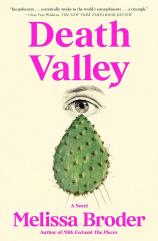Death Valley
Review
Death Valley
Melissa Broder is best known for her darkly funny novels THE PISCES and MILK FED, as well as her popular Twitter feed, So Sad Today. Her latest effort, DEATH VALLEY, is an immersive and uncanny exploration of grief: the good, the bad, the sublime and the hilarious.
“‘Help me not be empty’ I say to god in the Best Western parking lot.” When we meet the book’s narrator, she is smack-dab in the middle of two of the biggest tragedies of her life: her father is in the ICU after a series of complications following a car accident, and her husband is nearly a decade into a mysterious illness, the symptoms of which have crossed the line from alarming to infuriating. Wedged between her grievances --- for her father’s mortality, for her attraction to her husband, and for her ability to hold it all together --- she has escaped to the desert to work on her novel, journeying to the holiest of settings (a nondescript Best Western) in search of both inspiration and salvation.
"While this book will be most treasured by readers who recently have suffered (or at least anticipated) their own grief, DEATH VALLEY has a little something for everyone."
Although the narrator is unnamed and unidentifiable, Broder successfully makes her companionable and accessible to readers by exposing her most human, undignified qualities. On the front desk manager of the Best Western, she remarks that the woman is exactly her type, shaped like a “ripe tomato.” The artwork of the chain hotel mesmerizes her as much as the plain bedding comforts her. It is within this drab, arousing setting that she begins to accept that “there’s no need to play hard to get with god.”
As she settles into her personal writing retreat, the aptly named Death Valley desert --- with its extremes and blatant brushes with mortality --- forces her to recount not just the tragedies that have brought her there, but her responses to them. On her father’s condition, she realizes that she has idealized him, believing that if she does everything right while he is recovering, he will return to the father he was when she was a little girl, rather than the depressed man he has been for at least the last two decades of her life. On her husband, she begins to question whether or not she is right to hate the sound of his breathing. But it is not until she takes a walk in the desert that she really begins to dig deep into her grief.
When she happens upon a cactus in the middle of her walking path, too wide to circle her arms around and too tall to make any sense of, she notices a gash in its side, one that beckons like a doorway to Narnia. When she enters, the cool, moist climate of the cactus soothes her, but she soon discovers that she is not alone: her father is there. He is not the grumpy old man who fights for his life in a hospital bed miles away, but rather the young boy he once was, far removed from any signs of illness or death. She coddles him before seeing him as a teen, and then she meets her husband as a boy.
The vitality of these visions is a sharp contrast to the men she is already grieving despite their current statuses as living, and she is forced to question the notion of anticipatory grief. Is she grieving her loved ones smartly (or at least intellectually) by preparing for the inevitable, or has she given up on them too quickly, condemning herself to a lifetime of mourning while the men she loves are still fighting for their lives?
After a feverish walk through an inclement desert, the woman faces a fork in the road --- one path leads her home, where her grief will be accompanied by the mundane, cripplingly human facts of life; the other leads her deeper into the desert where nothing is certain, but where her grief is almost guaranteed to fall behind. When the path she chooses becomes its own fight for survival, she finally understands the men she loves, the grief she is carrying, and her own perspective on death and dying, but not without the sublime, darkly funny, ecosexual takedowns for which Broder is best known.
It has been said that grief is the price of love, and while no two humans can love the same, it is equally true that no two humans can grieve the same. In DEATH VALLEY, Broder gets to the heart of grief in a way that feels deeply personal yet expansively human. Her vehicle for this examination is not subtle --- “Come on,” it feels as though our narrator would say, “I’m literally walking through the valley of death” --- yet she evokes the pastoral with the skill of the most metaphorical of writers. She juxtaposes the obvious with the imagined to create a spirituality all her own, one that is as human and humble as a woman crying at the front desk of a Best Western and as magical and awe-inspiring as an impossible wild cactus.
Writing with her trademark sense of humor and keen eye for human emotion, Broder is at her best here. Grief, with all of its absurdities and commonalities, is a theme almost tailor-made for Broder, who is so adept at balancing reality and fantasy, horror and humor. While this book will be most treasured by readers who recently have suffered (or at least anticipated) their own grief, DEATH VALLEY has a little something for everyone.
Reviewed by Rebecca Munro on October 20, 2023
Death Valley
- Publication Date: May 7, 2024
- Genres: Fiction, Magical Realism
- Paperback: 256 pages
- Publisher: Scribner
- ISBN-10: 1668024861
- ISBN-13: 9781668024867




